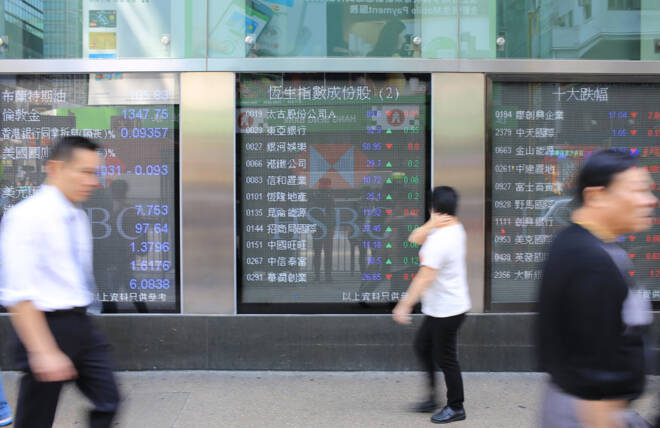Advertisement
Advertisement
Hang Seng Index, ASX 200, Nikkei 225: A Hawkish Fed to Spook Investors
By:
The Asian futures flash red, with US economic indicators, hawkish Fed comments, and the FOMC meeting minutes reducing bets on a Q1 Fed rate cut.
Highlights
- The ASX 200 led the Hang Seng Index into negative territory on Wednesday.
- Rising tensions in the Middle East and caution ahead of the FOMC meeting minutes and US Jobs Report contributed to the losses.
- On Thursday, the FOMC meeting minutes will set the tone, with Asian service sector PMI numbers also focal points.
Overview of the Wednesday Session
On Wednesday, the ASX 200 led the Hang Seng Index into negative territory. Overnight US economic indicators from Tuesday, rising 10-year US Treasury yields, and the US equity markets set the tone.
Investors turned cautious before the FOMC meeting minutes and the US Jobs Report. The upswing in 10-year US Treasury yields came despite a larger-than-expected fall in the US Manufacturing PMI.
On Tuesday, the Dow rose by 0.07%. However, the S&P 500 and the Nasdaq Composite Index saw losses of 0.57% and 1.63%, respectively. 10-year US Treasury yields climbed to a high of 4.024% before ending the session at 3.935% (+1.78%).
There were no Asian economic indicators to influence market risk sentiment. Rising tensions in the Middle East contributed to the Wednesday losses.
US Economic Data and the FOMC Meeting Minutes to Set the Tone
On Thursday, overnight Fed chatter, US economic data, and the FOMC meeting minutes from Wednesday will set the tone for the Asian session. FOMC voting member Thomas Barkin spooked the markets before the FOMC Meeting Minutes, warning that rate hikes remained on the table.
The FOMC Meeting Minutes showed members are willing to raise interest rates. Other members favored a higher-for-longer rate path, reducing bets on a Q1 2024 Fed rate cut.
The JOLTs Job Openings and better-than-expected US manufacturing sector contributed to the losses.
The US equity markets responded to the hawkish Fed and the stats. On Wednesday, the Dow and S&P 500 fell by 0.76% and 0.80%, respectively. The Nasdaq Composite Index slid by 1.18%.
However, investors must consider the Asian economic calendar. Service sector PMIs from Australia, Japan, and China need consideration. An unexpected contraction across the Chinese services sector could test market risk appetite. Economists forecast the China Caixin Services PMI to remain at 51.5 in December.
In the futures markets, the ASX 200 and Nikkei were down 19 and 400 points, respectively.
ASX 200
The ASX 200 slid by 1.37% on Wednesday. Losses were broad-based, with tech stocks tracking the Nasdaq into negative territory. The S&P ASX All Technology Index (XTX) tumbled by 2.67%.
Gold (XAU/USD) stocks: Evolution Mining Ltd. (EVN) and Northern Star Resources Ltd. (NST) slid by 2.76% and 4.01%, respectively. Oil stocks: Woodside Energy Group Ltd (WDS) and Santos Ltd (STO) declined by 0.95% and 1.56%, respectively.
Mining stocks and the big four banks had a gloomy Wednesday session.
Fortescue Metals Group Ltd. (FMG) fell 1.87%. BHP Group Ltd (BHP) and Rio Tinto Ltd. (RIO) ended the day down 1.52% and 1.35%, respectively.
Commonwealth Bank of Australia (CBA) declined by 1.30%. Westpac Banking Corp. (WBC) and ANZ Group Holdings Ltd (ANZ) saw losses of 0.91% and 0.96%, respectively. National Australia Bank Ltd. (NAB) fell by 0.87%.
Hang Seng Index
The Hang Seng Index declined by 0.85% on Wednesday. Concerns about the Chinese economy resonated. The Hang Seng Tech Index (HSTECH) declined by 1.84%. Property stocks also continued to freefall. The Hang Seng Mainland Properties Index (HSMPI) fell by 2.04%.
Alibaba (9988) fell by 1.87%. News of Alibaba losing an antimonopoly suit and having to pay JD.com 1 billion Yuan resonated. Tencent (0700) gained 1.35%.
Bank stocks had a mixed session. HSBC (0005) declined by 0.40%. China Construction Bank (0939) gained 0.66%, while Industrial Commercial Bank (1398) ended the session flat.
The Nikkei 225
(Graph for reference purposes only)
There was no trading on Wednesday, with the Japanese markets reopening on Thursday, January 4.
For upcoming economic events, check out our economic calendar.
About the Author
Bob Masonauthor
With over 28 years of experience in the financial industry, Bob has worked with various global rating agencies and multinational banks. Currently he is covering currencies, commodities, alternative asset classes and global equities, focusing mostly on European and Asian markets.
Advertisement
